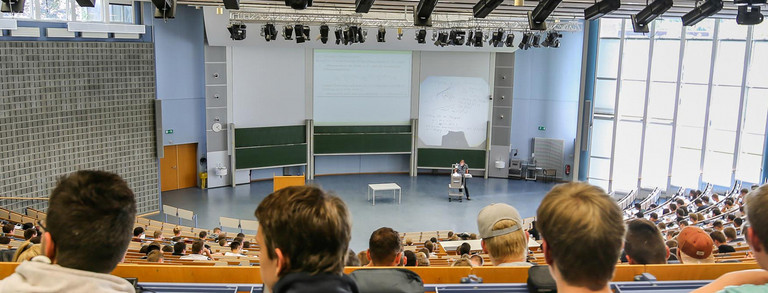Degree Programs from A to Z
The Sustainable Energy Systems program prepares students for work in the broad field of energy system transformation towards a climate-neutral, economic and supply-secure future. The main technical perspective targets the transition of the electrical power system based on renewable energy. Knowledge of its future design is supplemented by competencies in sustainability and digitalization for smart grids and markets.
to the degree program Sustainable Energy Systems (Master of Science (M.Sc.))
The Master’s degree program qualifies students for the increasing demand in professional practice for planning know-how with a sound scientific foundation. It teaches them the ability to organize and manage planning projects at all planning and decision-making levels as well as to lead interdisciplinary working groups. Together with a Bachelor’s degree in a relevant subject, the Master’s degree additionally permits graduates to commence a traineeship in urban development within the civil service.
to the degree program Spatial Planning (Master of Science (M.Sc.))
The education in the English-language specialization Process Systems Engineering enables students to design and operate complex chemical and biochemical production systems with the help of mathematical models and modern computer tools for simulation and optimization. Graduates also master methods of control and production planning as well as the analysis and description of experimental data. Process engineers are in great demand on the market, as it gives the chemical engineer the opportunity to acquire all the knowledge necessary not only for the planning of a chemical plant, but also for its simulation and optimization.
to the degree program Process Systems Engineering (Master of Science (M.Sc.))
Physics tries to measure quantifiable natural phenomena by means of specific experiments and to describe them theoretically by means of the simplest possible fundamental models. In constant cross-fertilization of experiment and theory, physics today has penetrated the realms of the largest dimensions - in astrophysics - as well as those of the smallest dimensions - in elementary particle physics. One of the guiding principles of the physics program at TU Dortmund University is to anchor the integration of experiment and theory, which has been so successful in research, already in education.
SPRING stands for Spatial Planning for Regions in Growing Economies and is a two-year Master’s degree program that addresses current spatial planning topics in developing and emerging countries. SPRING students discuss, for example, the challenges of rapid urban growth, reflect on the conflict between environmental protection and economic development, develop concepts to improve transport systems or define strategies to cope with the impacts of climate change.
The M.A. in Applied Linguistics is a research-based, bilingual program which qualifies students for professional activities that require deeper knowledge in this field. It goes beyond the training undertaken within the Bachelor’s degree program and teaches the ability for scientific work. This opens up further professional opportunities in higher education and scientific research. It is equally possible for students, having completed the Master’s degree program, to commence doctoral studies. Suitably qualified candidates who have already started their careers may also study for a Master’s degree.
to the degree program Applied Linguistics (Master of Arts (M.A.))
The Master of Science in Manufacturing Technology (MMT) focuses on the analysis of advanced manufacturing problems, with emphasis on the combination of scientific-theoretical courses and experimental industrial test setups. The Master’s degree program, conducted entirely in English, offers outstanding, motivated, and dedicated students an excellent university education in a research-based setting with industry collaborations. You can also experience intercultural exchange with your fellow students from all over the world.
to the degree program Manufacturing Technology (Master of Science (M.Sc.))





![[Translate to English:] Partner Four hands are holding the green logo of TU Dortmund University](/storages/tu_website/_processed_/1/d/csm_Partner_Nicole_Rechmann_KW_670eba0154.jpg)




![[Translate to English:] Forschung An apparatus with tubes in a laboratory](/storages/tu_website/_processed_/0/c/csm_Forschung_Juergen_Huhn_4fa3153b51.jpg)
![[Translate to English:] Studium Five students are sitting in a lecture hall. They are talking to each other.](/storages/tu_website/_processed_/c/9/csm_Studium_FelixSchmale_dbdbfb0dd7.jpg)





